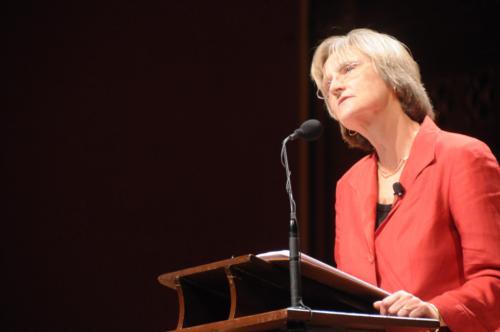
News
Summers Will Not Finish Semester of Teaching as Harvard Investigates Epstein Ties

News
Harvard College Students Report Favoring Divestment from Israel in HUA Survey

News
‘He Should Resign’: Harvard Undergrads Take Hard Line Against Summers Over Epstein Scandal

News
Harvard To Launch New Investigation Into Epstein’s Ties to Summers, Other University Affiliates

News
Harvard Students To Vote on Divestment From Israel in Inaugural HUA Election Survey
Faust Addresses Future of Univ.
University President calls for collaboration and increased efficiency

Eschewing her customary welcome back e-mail, Faust defined Harvard’s direction for the upcoming year in person yesterday—a renewed call for efficiency and cooperation across the University after a year marked by financial turmoil.
“We need to move—promptly but thoughtfully—to what others have called ‘a new normal,’” Faust said, warning an audience that filled just over half of Sanders Theatre that the financial situation would not “simply bounce back to where it was.”
Citing inefficiencies in the University’s library systems and IT infrastructure as examples, Faust said that efforts to consolidate would not only save money, but would also improve the quality of these services.
Faust pointed to another instance in which the University was able to squeeze savings by centralizing office supply purchases and printing orders: the subtle differences in ink choice on the Veritas shield featured on Harvard employees’ business cards.
“The shade of crimson is far less important than the fact that it is Crimson,” Faust said, breaking into a smile as she played up the symbolism in her example. “When each of us has discretion to decide which of 30 different shades of Crimson to put on our business cards, we’ve carried things too far.”
Harvard’s endowment investments fell 27.3 percent in the fiscal year ending June 30, bringing its total value down to $26 billion—an $11 billion drop. Faust reminded audience members that payout from the endowment will decline by 8 percent in dollar value for at least this year and the next.
Harvard’s other two income streams—tuition and fundraising—also shrank, with gift receipts down 8 percent.
Over the past year, massive budget cuts across the board resulted in slowed faculty hiring, 275 layoffs, early retirement incentives, as well as a slowdown in Allston construction. Capital spending is expected to decrease by roughly 50 percent, Faust said, to keep spending in line with the University’s new fiscal constraints.
In contrast to the bleak financial picture Faust detailed, the event ended on a relatively positive note, with Faust pointing to examples of cross-school academic initiatives, such as a recent push for global health programs.
“The larger point is this,” Faust concluded. “Whether our endowment is $37 billion or $26 billion, there is a wealth of intellectual opportunity within this University.”
Though audience response was overwhelmingly positive, praising Faust for her clarity, transparency, and willingness to engage the community, some grumbled that there remain many unanswered questions.
Computer Science Professor and former Dean of the College Harry R. Lewis ’68 pulled out a list that he jotted down during Faust’s speech numbering issues that have yet to be addressed, including faculty and administrator staffing levels across the University.
“There’s no sense of academic direction,” Lewis said. “We’re told to contract, but we haven’t heard anyone say broadly what areas or departments need to be contracted more.”
—Staff writer Athena Y. Jiang can be reached at ajiang@fas.harvard.edu.
—Staff writer June Q. Wu can be reached at junewu@fas.harvard.edu.
Want to keep up with breaking news? Subscribe to our email newsletter.
